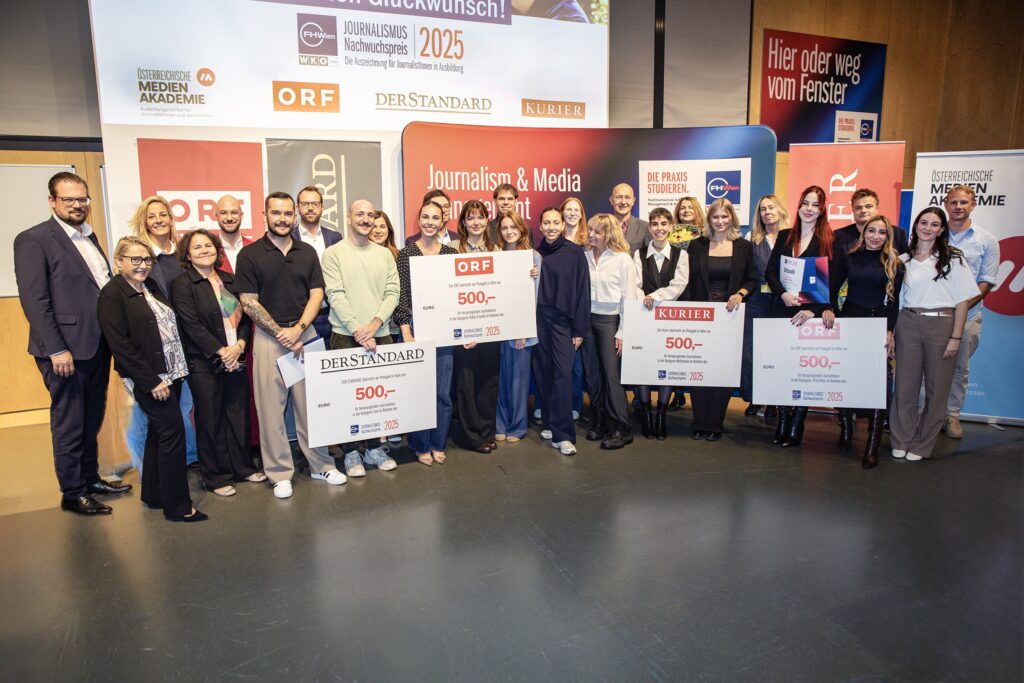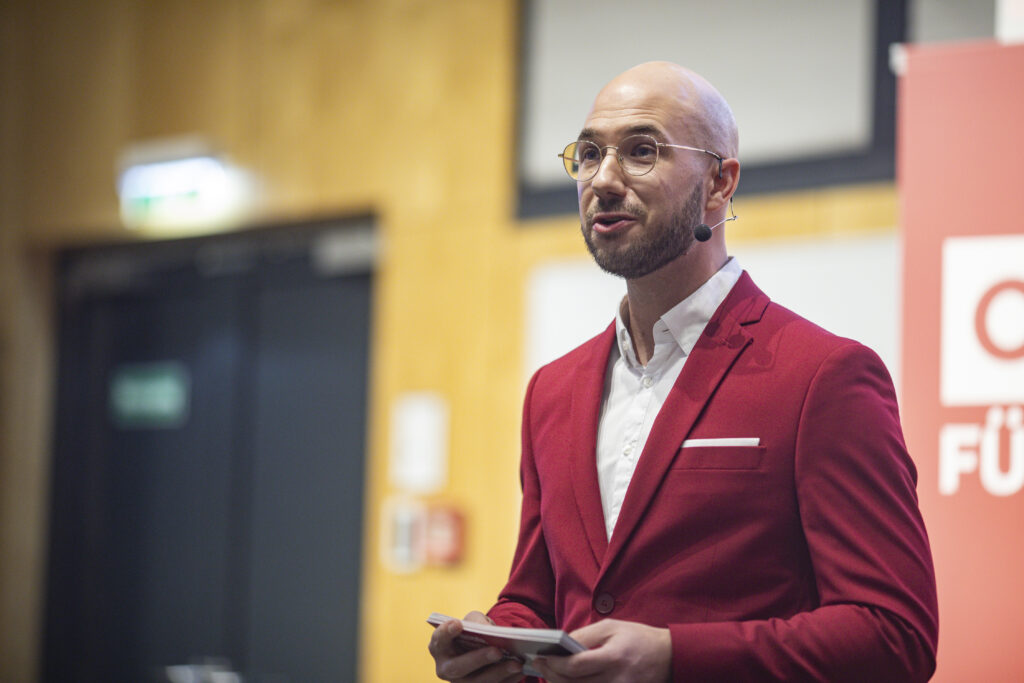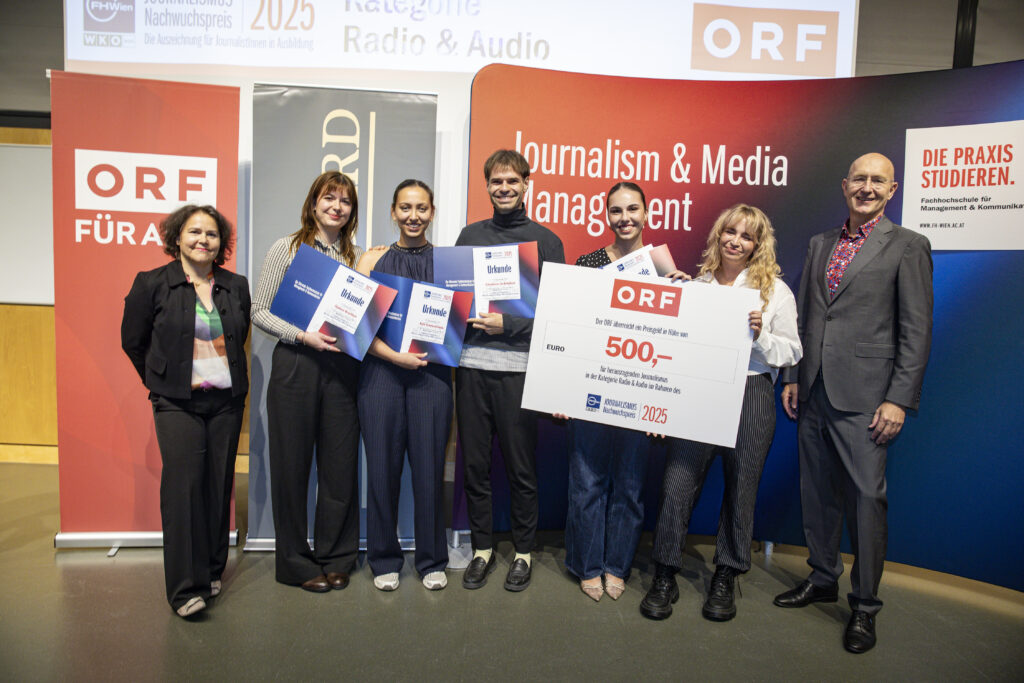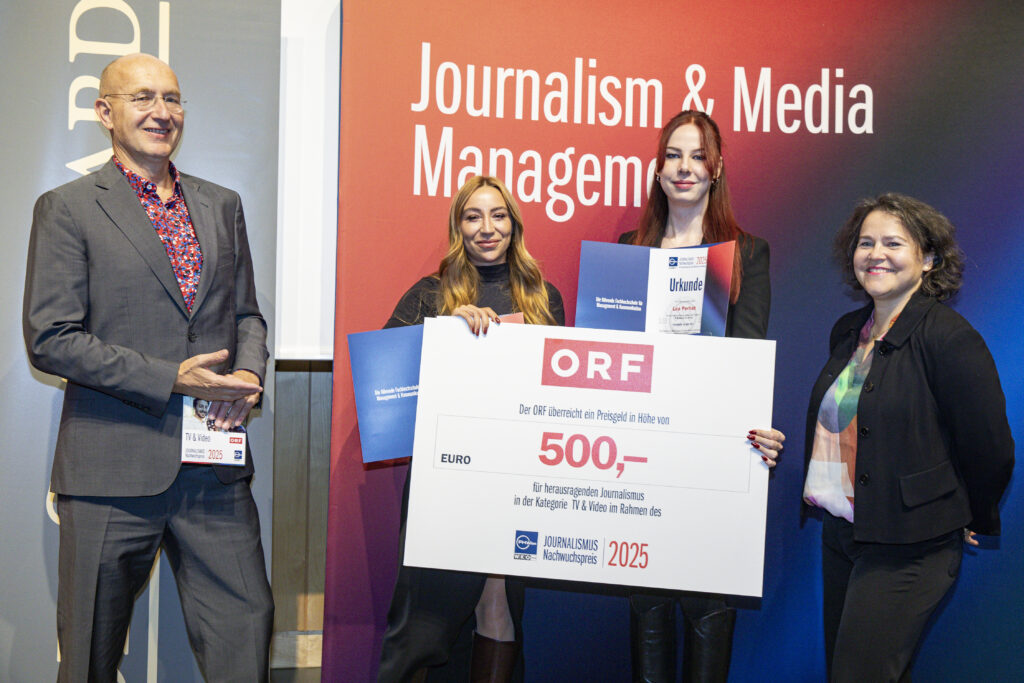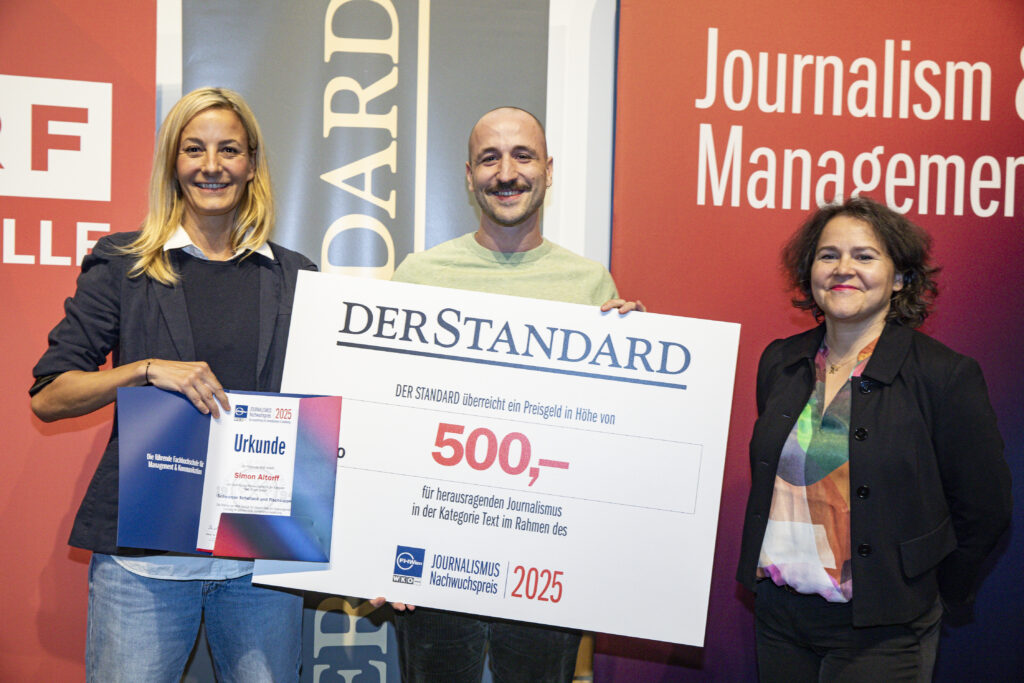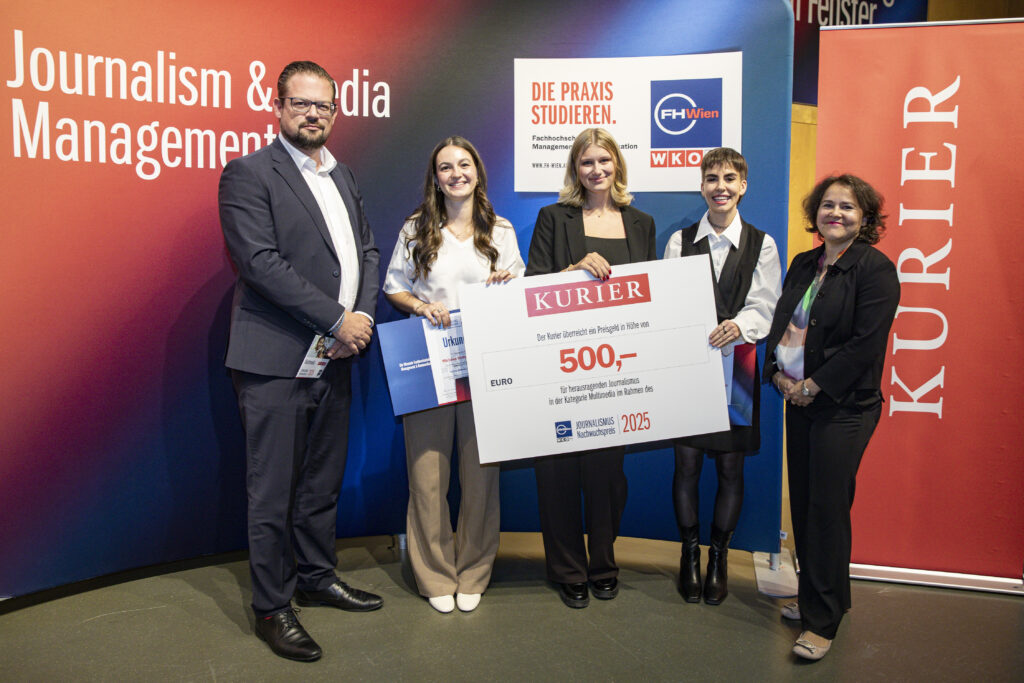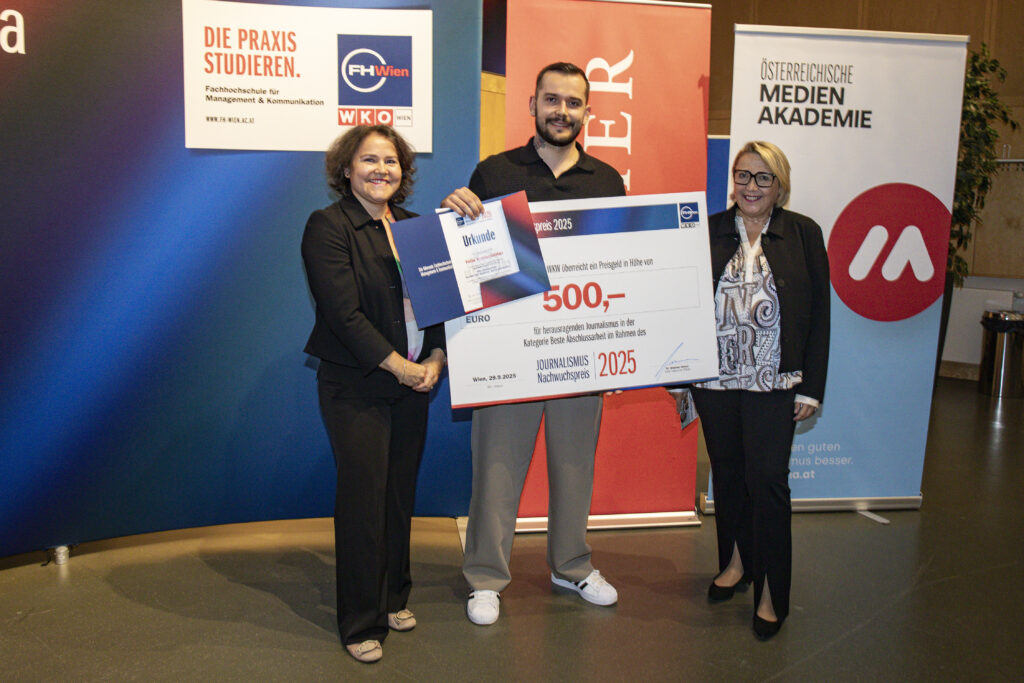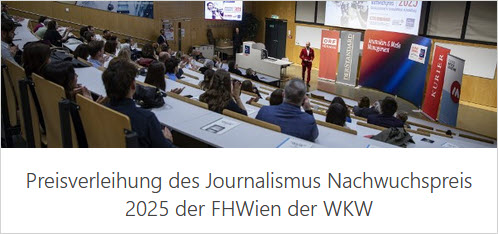On September 29, 2025, FHWien der WKW presented the Journalism Young Talent Award for the seventh time. A total of 82 entries were submitted by aspiring journalists from various journalism training institutions across Austria. The award-winning works reflect topics drawn from the lived realities of young journalists. In doing so, they address social developments and contribute fresh perspectives to the public debate.
At the Journalism Young Talent Awards, works on socially relevant topics took center stage: from digital loneliness and relationships with artificial intelligence to impressive portraits of a piano maker and a palliative care nurse, all the way to cultural identity in the Basque Country.
With the award, FHWien der WKW supports young journalists and offers them a platform to present their work to the industry and a wider audience. Once again, the prizes were awarded with the support of partners from the industry. The event was hosted by moderator Patrick Sieber, himself a journalism student at FHWien der WKW.
Digital Loneliness and Love for AI
In the Radio & Audio category, the feature “Digital Loneliness – About reconnecting with the real world”by Hanna Kastner, Isis Lauermann, Anke Mandl, Emily Patek, Sarah Roland and Clemens Schreiber won over the jury. The piece explores the phenomenon of digital loneliness and, through conversations with young people and experts, illustrates how social media and AI chatbots are transforming relationships – and how those affected find new ways to real-life encounters.
In the TV & Video category the prize went to Lea Perhab, Stephanie Pontasch and Katharina Nachbaur for “In Love with AI”. The documentary follows a protagonist testing AI apps for their suitability as relationship partners and poses a question that is both romantic and unsettling: Is the love of the future programmed – or will it remain a human adventure?
Piano Workshop as a Cultural Space
The other award-winning pieces also placed reflections on humanity at the center. In the Text category, Simon Altorff won with “Black Shellac and Fish Soup”. His reportage portrays Viennese piano maker Bernhard Balas, whose workshop is not only a place for restoring historical instruments but also serves as a social meeting point and cultural space.
Multimedia Award for Insights into the Palliative Care Unit
In the Multimedia category, the project “Final Stop: Human”by Melissa Untersmayr, Irina Wittmann and Lisa Marie Wögerbauertook first place. The reportage follows a qualified nurse in his daily work on the palliative care unit at Vienna General Hospital (AKH). With sensitivity and impact, the authors convey how deeply humanity remains at the heart of his work – even where life comes to an end.
Magazine on Cultural Identity in the Basque Country
The award for best thesis went to Felix Kohlschütter for “The Basque Country – Conflict over Language, Land, and Culture”. His work examines how closely identity, politics, and history are interwoven in a region still grappling with its sense of self. Designed in the style of a magazine dossier, his project combines reports, interviews, and analyses to shed light on the cultural and political tensions in the Basque Country.
Supporting Young Journalists at Career Entry
The Journalism Young Talent Award is endowed with € 500,- per category and was once again awarded in 2025 with the support of strong media partners. “Der Standard” sponsored the Text category, with Deputy Editor-in-Chief Nana Siebert presenting the award. “Kurier” supported the Multimedia category, presented by Deputy Editor-in-Chief Christoph Schwarz. New as a partner was ORF, which supported the categories Radio & Audio as well as TV & Video. The awards were handed over by Konrad Mitschka from ORF’s Public Value Competence Center. Also new as a partner, the Austrian Media Academy provided a seminar placement of choice in addition to the prize money awarded by FHWien der WKW for the Best Final Thesis category.
Jury of Journalists and Experts from FHWien der WKW
The works were evaluated by an independent jury consisting of renowned journalists and experts from FHWien der WKW. In addition to Head of Department Daniela Süssenbacher and program directors Regula Blocher, Carola Leitner, Martin Reichenauer and Karina Schwann, eight independent journalists served as jurors. For the Radio & Audio category, Bea Sommersguter and Matthias Däuble (both Ö1) made the decision. In the TV & Video category, the jurors were Ed Moschitz (ORF) and Christine Grabner. The winning text was selected by Wolfgang Sablatnig (Tiroler Tageszeitung) and Julia Ortner (ORF). The award in the Multimedia category was decided by Yvonne Widler (Kurier) and Max Miller (Profil).
Further impressions of the award ceremony can be found here:

About the Journalism Young Talent Award – The Prize for Aspiring JournalistsJournalism means asking questions, telling stories, and making new perspectives visible. For journalism to have an impact, it needs an audience – a stage where relevance becomes tangible. The Journalism Young Talent Award of FHWien der WKW offers aspiring journalists exactly this stage: for quality, creativity, and relevance. The award is open to all aspiring journalists who have completed or are currently enrolled in a journalism-related education in Austria within the past year and are at least 18 years old at the time of submission. Eligible entries include journalistic works created within the framework of studies at an Austrian university, academy, newsroom training program, or any other educational institution with a focus on journalism. FHWien der WKW intends to continue the Journalism Young Talent Award in the future in order to sustainably support journalism education in Austria as well as the career entry of young journalists. With their socially relevant topics, this year’s winners have demonstrated that they are working at the pulse of the times and are contributing important perspectives to the industry. We warmly congratulate all the award winners! |
